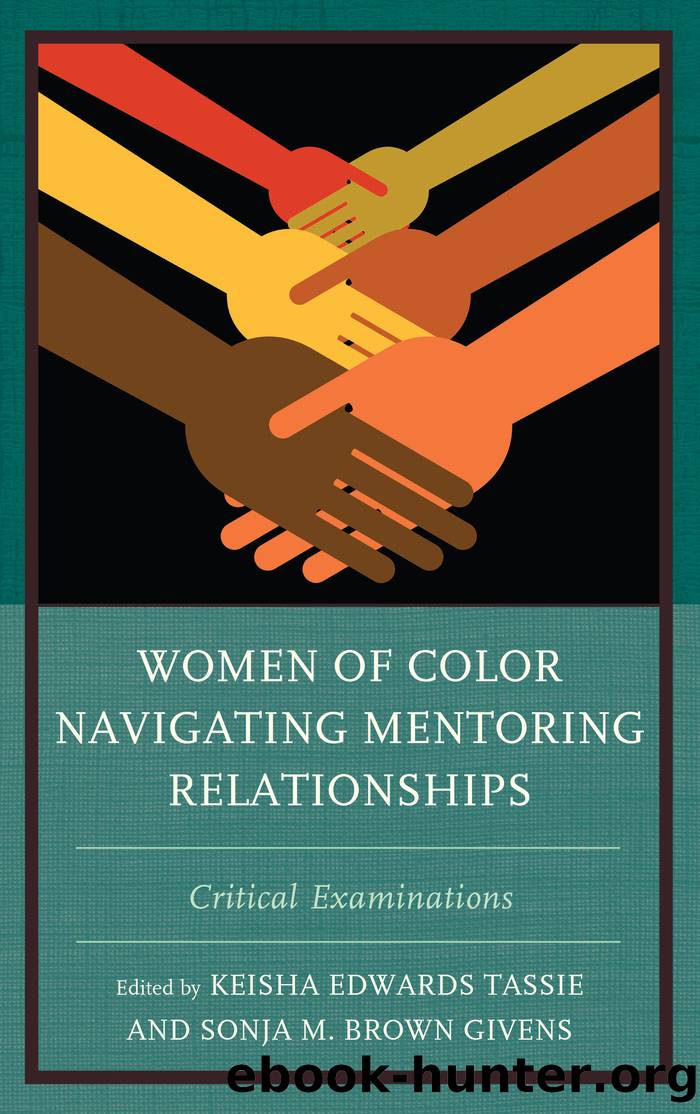Women of Color Navigating Mentoring Relationships by unknow

Author:unknow
Language: eng
Format: epub
Tags: undefined
Publisher: Lexington Books/Fortress Academic
Published: 2012-08-15T00:00:00+00:00
References
Allen, W. R. (1992). The color of success: African-American college student outcomes at predominantly white and historically black public colleges and universities. Harvard Educational Review, 62, 45â65.
Berry, T. R., & Mizelle, N. D. (2006). From oppression to grace: Women of color and their dilemmas within the academy. Virginia: Stylus.
Davidson, M. N., & Foster-Johnson, L. (2001). Mentoring in the preparation of graduate researchers of color. Review of Educational Research, 71(4), 549â574.
Frazier, K. (2011). Academic bullying: A barrier to tenure and promotion for African-American faculty. Florida Journal of Educational Administration & Policy, 5, 1â13.
Green, A. L., & Scott, L. V. (Eds.). (2003). Journey to the Ph.D.: How to navigate the process as African Americans. Sterling, VA: Stylus.
Howard-Vital, M. R. (1989). African-American women in higher education: Struggling to gain identity. Journal of Black Studies, 20(2), 180â191.
Johnson, I. H. (1996). Access and retention: Support programs for graduate and professional students. New Directions for Student Services, 74, 53â67.
Johnsrud, L. K., Sadao, K. C. (1998). The Common Experience of âOthernessâ: Ethnic and Racial Minority Faculty. The Review of Higher Education, 21, 315â342.
Jones, C., & Shorter-Gooden, K. (2003). Shifting: The double lives of black women in America. New York: Harper Collins.
Levin, J. S., Walker, L., Haberler, Z., & Jackson-Boothby, A. (2013). The Divided Self: The Double Consciousness of Faculty of Color in Community Colleges. Community College Review, 41, 311â329.
Mallinckrodt, B. (1988). Student retention, social support, and dropout intention: Comparison of black and white students. Journal of College Student Development, 29, 60â64.
Meghan, P. J., & Baker, V. L. (2014). âIt could be just because Iâm differentâ: Otherness and its outcomes in doctoral education. Journal of Diversity in Education, 7, 14â30.
Montgomery, B. L., Dodson, J. E., & Johnson, S. M. (2014). Guiding the way: Mentoring graduatestudents and junior faculty for sustainable academic careers. Sage Open, 1â11.
Nettles, M. T. (1990). Success in doctoral programs: Experiences of minority and white students. American Journal of Education, 98(4), 494â522.
Patton, L. D. (2009). My sisterâs keeper: A qualitative examination of mentoring experiences among African American women in graduate and professional schools. The Journal of Higher Education, 80, 510â537.
Patton, L. D., & Harper, S. R. (2004). Mentoring relationships among African American women in graduate and professional schools. New Directions for Student Services, 104, 67â78.
Roberts, L. M., Wooten, L. P., & Davidson, M. N. (2015). Positive organizing in a global society: Understanding and engaging differences for capacity building and inclusion. New York: Routledge.
Stanley, C. A. (1996). Coloring the academic landscape: Faculty of color breaking the silence in predominantly white colleges and universities. American Educational Research Journal, 43, 701â736.
Steele, C. M. (1997). A threat in the air: How stereotypes shape intellectual identity and performance. American Psychologist, 52, 613â629.
âââ. (1998). Stereotyping and its threat are real. American Psychologist, 53, 680â681.
âââ. (2011). Whistling Vivaldi: How stereotypes affect us and what we can do. New York: W.W. Norton & Company.
Steele, C. M., & Aronson, J. (1995). Stereotype threat and the intellectual test performance of African-Americans. Journal of Personality and Social Psychology, 69, 797â811.
Tenenbaum, H. R., Crosby, F. J., & Gliner, M.
Download
This site does not store any files on its server. We only index and link to content provided by other sites. Please contact the content providers to delete copyright contents if any and email us, we'll remove relevant links or contents immediately.
Cecilia; Or, Memoirs of an Heiress — Volume 1 by Fanny Burney(32558)
The Great Music City by Andrea Baker(32020)
Cecilia; Or, Memoirs of an Heiress — Volume 2 by Fanny Burney(31956)
Cecilia; Or, Memoirs of an Heiress — Volume 3 by Fanny Burney(31942)
We're Going to Need More Wine by Gabrielle Union(19046)
All the Missing Girls by Megan Miranda(16031)
Pimp by Iceberg Slim(14508)
For the Love of Europe by Rick Steves(14121)
Bombshells: Glamour Girls of a Lifetime by Sullivan Steve(14077)
Talking to Strangers by Malcolm Gladwell(13371)
Norse Mythology by Gaiman Neil(13370)
Fifty Shades Freed by E L James(13243)
Mindhunter: Inside the FBI's Elite Serial Crime Unit by John E. Douglas & Mark Olshaker(9344)
Crazy Rich Asians by Kevin Kwan(9292)
The Lost Art of Listening by Michael P. Nichols(7506)
Enlightenment Now: The Case for Reason, Science, Humanism, and Progress by Steven Pinker(7314)
The Four Agreements by Don Miguel Ruiz(6765)
Bad Blood by John Carreyrou(6622)
Weapons of Math Destruction by Cathy O'Neil(6281)
